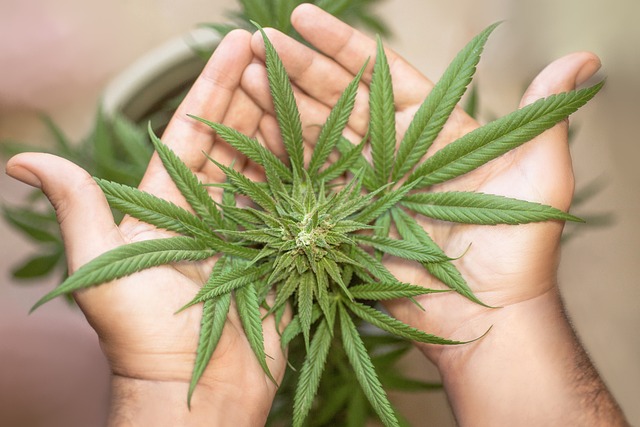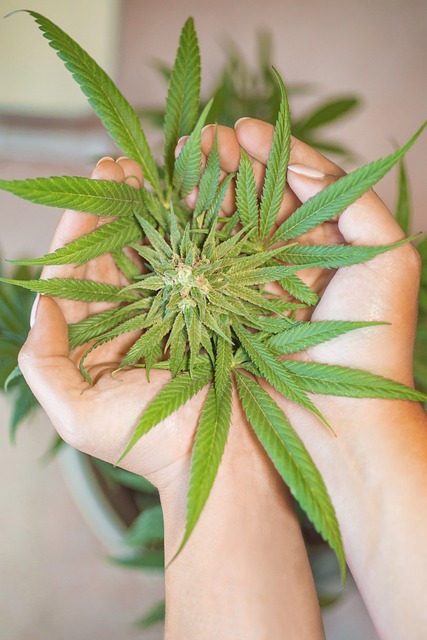2023 marked a significant shift in the legal status of THCA (tetrahydrocannabinolic acid) in Rhode Island, recognizing it as a legal therapeutic compound within its medical marijuana program. This non-psychoactive precursor to THC has garnered attention for its potential health benefits, including anti-inflammatory, neuroprotective, and pain-relieving effects, as well as its role in managing symptoms like nausea and vomiting associated with chemotherapy. The state's legislative change not only provides a clear legal pathway for consumers to access THCA but also supports research into its therapeutic properties. Rhode Island's progressive approach to THCA legality is setting a precedent for other states, offering patients natural alternatives to traditional medications and contributing valuable insights to the cannabis industry. This move underscores the importance of legal frameworks that facilitate responsible commerce and informed consumer choices in medical cannabis programs.
Exploring the therapeutic potential of cannabinoids has led to a growing interest in THCA, or tetrahydrocannabinolic acid, a non-psychoactive compound found in the cannabis plant. This article delves into the multifaceted benefits of THCA flowers from a legal standpoint, particularly within Rhode Island’s regulatory framework. We’ll uncover how THCA has risen as a wellness phenomenon post-legalization and what sets it apart from other cannabinoids. From its potential health advantages in addressing conditions like rheumatoid arthritis to its neuroprotective qualities, this piece examines the various aspects of THCA’s impact on wellbeing. Additionally, we will explore its antiemetic effects, its role in appetite and digestion, and its place in cancer research. With a focus on legal compliance and responsible consumption, readers will learn how to incorporate THCA flowers into their wellness routine, all while adhering to Rhode Island’s guidelines. Join us as we navigate the complex terpene profiles of THCA flowers and understand the nuanced differences between THCA and THC for optimal therapeutic use.
- THCA Flower Benefits Unveiled: A Legal Perspective in Rhode Island
- The Rise of THCA as a Wellness Phenomenon Post-Legalization
- Understanding THCA: What Sets It Apart from Other Cannabinoids?
- Potential Health Advantages of THCA Flowers for Rheumatoid Arthritis
- Exploring the Neuroprotective Properties of THCA in Neurological Disorders
- The Antiemetic and Anti-Nausea Effects of THCA: A Rhode Island Angle
THCA Flower Benefits Unveiled: A Legal Perspective in Rhode Island

In Rhode Island, the conversation around cannabis derivatives has evolved significantly with the legislative changes that have positioned THCA-rich flowers within a legal framework. The state’s regulations recognize THCA as a legal compound, offering consumers a safe avenue to explore its potential benefits. THCA, or Tetrahydrocannabinolic Acid, is the raw form of THC found in the cannabis plant and has garnered attention for its therapeutic properties. In Rhode Island, where the use of medical marijuana is sanctioned under state law, THCA flower is emerging as a topic of interest among patients seeking alternatives to traditional THC or CBD products. The legal status of THCA in Rhode Island allows researchers and consumers alike to investigate its benefits, which may include anti-inflammatory, neuroprotective, and potential pain-relieving effects, without the psychoactive effects that come with its decarboxylated form, THC.
The legal clarity surrounding THCA in Rhode Island has opened doors for both therapeutic exploration and responsible commerce. As the state’s regulatory framework continues to mature, it is poised to offer insights into the potential of THCA flowers as a natural remedy. This legal standing not only facilitates access to these products but also promotes awareness about their usage and effects, contributing to a more informed and regulated marketplace where consumers can make educated decisions regarding their health and well-being. Rhode Island’s progressive stance on THCA has positioned the state at the forefront of cannabinoid research, offering a beacon for other states considering the legal implications of including such compounds within their medical programs.
The Rise of THCA as a Wellness Phenomenon Post-Legalization

2023 has seen a significant uptick in the prominence of THCA, or tetrahydrocannabinolic acid, within the wellness community, particularly following its legalization in states like Rhode Island. This non-psychoactive precursor to THC has garnered attention due to its potential therapeutic properties, which include anti-inflammatory, neuroprotective, and possibly anti-cancer effects, as researchers continue to explore its benefits. The rise of THCA as a wellness phenomenon is not only attributed to its promising health benefits but also to the evolving legal landscape that now includes Rhode Island as a state where THCA flowers are legally available for consumers interested in exploring this cannabinoid’s potential. This accessibility has led to a surge in its use, with individuals seeking natural alternatives to traditional pharmaceuticals for pain relief and other health concerns. The demand for THCA-rich products has spurred innovation within the industry, resulting in a variety of THCA flower strains that cater to diverse wellness needs, ensuring that those in states like Rhode Island have access to high-quality, legal options that align with their health objectives.
Understanding THCA: What Sets It Apart from Other Cannabinoids?

THCA, or Tetrahydrocannabinolic Acid, is a natural cannabinoid found in the Cannabis sativa plant and is considered the precursor to THC (Tetrahydrocannabinol), which is more commonly known for its psychoactive effects. Unlike THC, THCA is non-psychoactive, allowing users to experience potential benefits without the traditional ‘high’ associated with cannabis consumption. This distinction sets THCA apart from other cannabinoids like CBD (Cannabidiol) and CBN (Cannabinol), each offering unique properties.
In Rhode Island, where legislation has evolved to include more favorable views towards cannabis derivatives, THCA has gained attention for its therapeutic potential. Legality varies across different states, but in Rhode Island, THCA is legal provided it is derived from hemp compliant with the 2018 Farm Bill and contains less than 0.3% THC. This legal distinction is crucial for consumers and producers alike, as it opens up a new realm of wellness applications without the need to navigate complex legal landscapes. The non-psychoactive nature of THCA makes it an attractive option for individuals seeking the potential health benefits associated with cannabis without altering their mental state, including relief from inflammation, nausea, and pain, as well as supporting overall well-being.
Potential Health Advantages of THCA Flowers for Rheumatoid Arthritis

THCA, or Tetrahydrocannabinolic Acid, is a non-psychoactive cannabinoid found in the Cannabis sativa plant that has garnered attention for its potential therapeutic properties. Particularly for individuals suffering from rheumatoid arthritis, THCA flowers have been explored for their anti-inflammatory and analgesic effects. Preliminary research suggests that THCA may help alleviate the painful symptoms associated with rheumatoid arthritis by inhibiting the proliferation of immune cells, thus reducing inflammation. This could be a significant development for patients looking for alternative or complementary treatments to manage their condition. In Rhode Island, where the legal landscape regarding cannabis products has become more favorable, THCA flowers are an accessible option for those seeking the potential benefits without psychoactive effects. The legality of THCA in Rhode Island allows for its exploration as a treatment option within the framework of state law, providing hope for patients who may find relief from the debilitating symptoms of rheumatoid arthritis through this natural compound. It is important to note that while the potential health advantages are promising, further clinical research is necessary to fully understand the efficacy and safety profiles of THCA in treating rheumatoid arthritis. Patients should consult with healthcare professionals before incorporating THCA flowers into their treatment regimen.
Exploring the Neuroprotective Properties of THCA in Neurological Disorders

THCA, or Tetrahydrocannabinolic Acid, is a non-psychoactive precursor to THC found in cannabis and hemp plants, gaining attention for its potential therapeutic benefits. Research has begun to uncover the neuroprotective properties of THCA, particularly in the context of neurological disorders. Studies suggest that THCA may exert protective effects against neurodegenerative processes, potentially offering a new avenue for treatment and management of conditions like Alzheimer’s and Parkinson’s disease. In vitro and animal studies have indicated that THCA could modulate neural cell activity without the psychoactive effects associated with its decarboxylated form, THC. This selective action on the endocannabinoid system is of particular interest to scientists exploring novel treatments for neuroinflammation and oxidative stress, which are often implicated in the pathogenesis of these disorders.
The legal landscape regarding cannabis and its derivatives varies across jurisdictions within the United States, with Rhode Island being one of the states where THCA is legal under certain conditions. The state’s legislature has recognized the potential therapeutic value of cannabinoids, including THCA, and has accordingly established regulations that allow for the use of medical marijuana products containing this compound. As such, individuals in Rhode Island have access to THCA-rich products for therapeutic purposes, provided they adhere to state laws and obtain these products from licensed dispensaries or cultivators. The implications of this legal framework are significant, as it facilitates research and clinical trials that can further elucidate the benefits of THCA in treating a range of neurological conditions.
The Antiemetic and Anti-Nausea Effects of THCA: A Rhode Island Angle

THCA, or tetrahydrocannabinolic acid, is a non-psychoactive cannabinoid found in the Cannabis sativa plant from which THC (tetrahydrocannabinol) is derived. Unlike its psychoactive counterpart, THCA has been studied for its potential therapeutic properties, including its antiemetic and anti-nausea effects. In Rhode Island, where the legal landscape regarding cannabis products has evolved to recognize the medicinal benefits of these compounds, THCA has garnered attention for its promise in alleviating symptoms related to chemotherapy, such as nausea and vomiting. Research suggests that THCA may interact with the body’s endocannabinoid system, influencing neurological pathways involved in controlling vomiting and nausea without the psychoactive side effects associated with THC. As Rhode Island continues to explore the medicinal applications of cannabis, the therapeutic potential of THCA is becoming increasingly relevant for those seeking alternative treatments for conditions that cause nausea and vomiting. The state’s progressive stance on cannabis research has paved the way for further investigation into the benefits of THCA, potentially offering new avenues for treatment and highlighting the importance of continued study into the diverse effects of cannabinoids within the therapeutic realm.
In conclusion, the emerging research on THCA, its legal status in Rhode Island, and the multifaceted benefits it offers present a compelling case for its inclusion as a wellness tool. From its anti-inflammatory properties potentially alleviating symptoms of rheumatoid arthritis to its neuroprotective qualities that could revolutionize treatment for neurological disorders, THCA’s impact is far-reaching. Moreover, its antiemetic and anti-nausea effects, especially as they pertain to the Rhode Island context, highlight its potential in healthcare. As THCA continues to gain recognition post-legalization, it becomes increasingly clear that this cannabinoid holds significant promise for a variety of health concerns, all while maintaining compliance with state laws. It is an exciting time for research and application of THCA flower benefits, with ongoing studies poised to unveil even more of its therapeutic potential.
